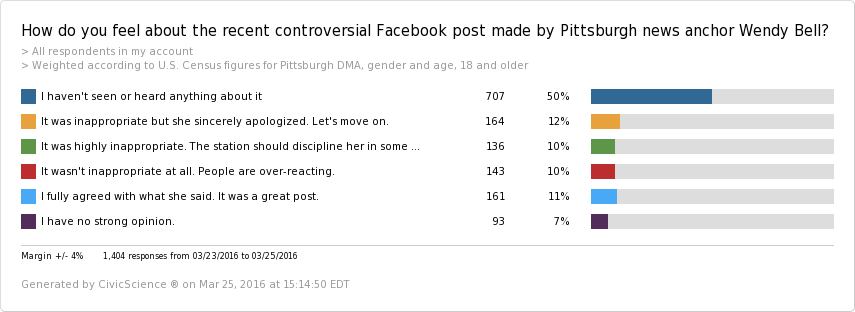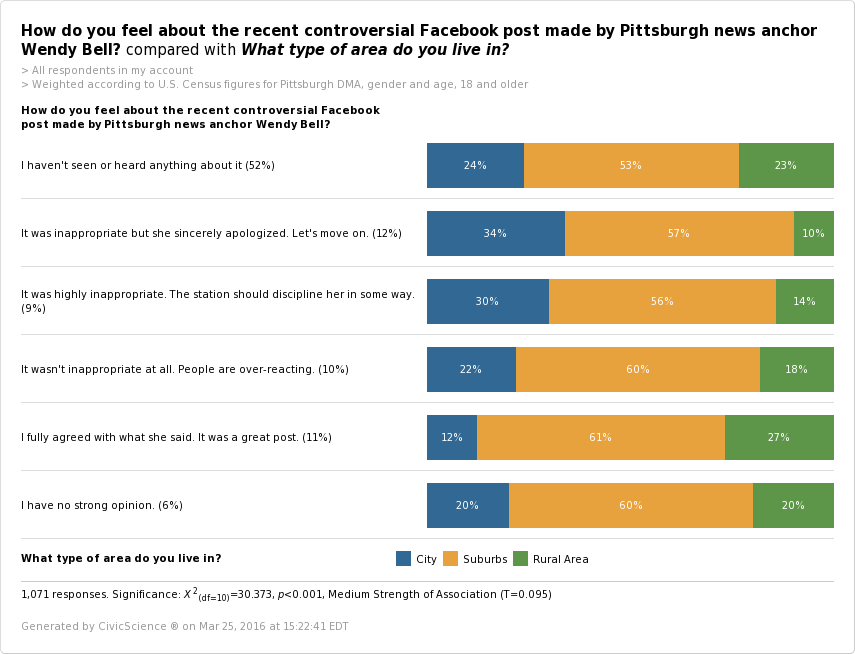If you think you’ve had a bad week, look no further than Pittsburgh news anchor Wendy Bell to make yourself feel better. After what was a seemingly-well-intended but disastrous Facebook post she wrote about race and violence, Bell came under a deluge of criticism – spanning far beyond the Pittsburgh media market. The post was eventually recanted, along with an apology from Bell, then another from her employer, WTAE. But the Internet and social media buzz has hardly slowed.
If you read the comments on Wendy’s Facebook page or any of the numerous articles on the subject, you see a more complicated story. Outrage over the racial narrative in her post is balanced – if not exceeded – by people supporting Bell and her point of view. Both sides are angry. Welcome to 2016.
Because we have such strong data coverage in our hometown, we quickly went to work polling the Pittsburgh media market on this controversial topic. Here’s what our initial sample of 1,404 Pittsburgh Metro-area adults had to say:
Overall, the numbers are remarkably divided. When we remove the people who are unaware of the controversy (more on that in a minute), 44% of aware respondents believed that her post was inappropriate, with 20% saying that WTAE should discipline Bell in some way. Conversely, 42% believe that Bell’s post was NOT inappropriate, with 22% of people saying they agreed with her.
Before we look at the underlying numbers, I need to point out that awareness on this issue is rising fast. In the first few hundred responses we collected Wednesday night, nearly 70% of Pittsburghers had yet to hear anything about Bell’s post. By mid-day yesterday, only 55% of people were unaware. In the last couple hours, we are seeing less than 35% “unaware” in the Pittsburgh market. This is big news by local standards.
When we look at the aggregate data collected over the past couple days, the numbers look even. But it’s not that simple. The people who viewed Bell’s post as inappropriate were much more likely to be female. Men are more likely to say that people are overreacting. Young people were much more likely to be offended by the post, especially those under age 29. The people who found Bell’s comments to be appropriate were likely to be older.
The really big differences, however, are found when we look at race and urbanicity. African American respondents were a full 2 1/2 times more likely than White respondents to consider Bell’s post “highly inappropriate” and deserving of some action by her employer. White respondents were 3X more likely to agree with Bell’s point of view. It’s important to note that African Americans make up only about 13% of the Pittsburgh Metro Area – which means that our overall results would be much different if there was more racial parity in the region.
We can see these divisions even more clearly when we look at the types of areas (City, Suburbs, Rural) in which our respondents live:

People living in the city are much more likely to fall into the “Wendy’s Post was Inappropriate” camp than those in the suburbs or rural parts of the region. Only 12% of respondents who agreed with Bell’s sentiment live in the City. Bell’s supporters significantly over-index as rural dwellers.
What does all of this mean? That’s for you to decide. I’m just the numbers guy.








